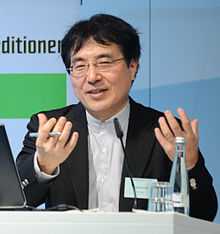Tetsunari Iida
| Tesunari Iida 飯田哲也 | |
|---|---|
 | |
| Born |
January 8, 1959 Shūnan, Yamaguchi, Japan |
Tetsunari Iida (飯田 哲也, Iida Tetsunari; born 1959, Yamaguchi Prefecture, Japan) is director of the Institute for Sustainable Energy Policies in Japan. Following the Fukushima nuclear disaster, he is calling for a decrease in Japan's reliance on nuclear power and an increase in renewable energy use.[1]
Iida says that, from 2008 to 2010, Japan's annual increase in solar power capacity jumped from 230 megawatts to almost 1 gigawatt, giving the country a total capacity of 3.6 gigawatts. He believes that, with continuing government support, huge solar farms will become economically attractive in Japan for the first time.[2]
Biography
Iida started his career as a nuclear engineer, but he quit in 1992, and went to study renewable energy in Sweden. When he returned to Japan in 1998, he formed the Institute for Sustainable Energy Policies. Since then he has set up several green mutual funds.[3]
In September 2011, Iida launched the Japan Renewable Energy Foundation, which is backed by ¥1 billion (US$13 million) from Japan's richest man, Masayoshi Son. The foundation will bring together some 100 experts from around the world to analyse obstacles to implementing renewable energy, and offer policy recommendations to the new Japanese government.[2]
See also
References
- ↑ "Anti-nuclear researcher to sit on gov't panel on energy policies". Mainichi Daily News. September 27, 2011.
- ↑ 2.0 2.1 David Cyranoski (Vol. 477, No. 13-14 (2011)). "Japan's new leader faces energy gap". Nature. Check date values in:
|date=(help) - ↑ Mark Pendergrast (1 November 2011). "Japan's Tipping Point Part 2: Tetsunari Iida and ISEP". Renewable Energy World.
External links
- Institute for Sustainable Energy Policies Japanese & English